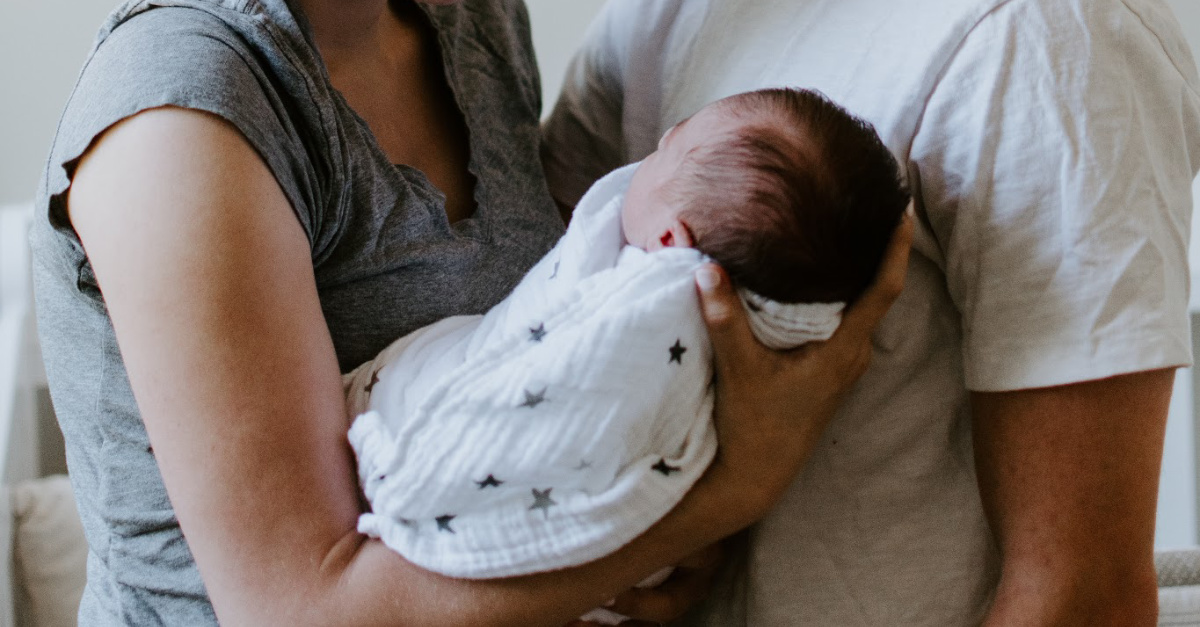Is Your Family Being Called into Foster Care?

The decision to open your home and become a Foster Family is a big one!
There are a lot of hoops to jump through. Often, people around you will discourage you from jumping into this hard work, and the system itself can be hard to navigate. It can be hard to know if stepping out in faith to be one who loves those our society finds hard to care for is the right next step for you.
One of the first moments I knew I one day wanted to open my home as a Foster Parent was when one of my 3rd-grade students saw a picture of our modest backyard and longingly called it a “park.” He declared how lucky my kids were to live at a home with such a nice backyard! At the time, I felt like my husband and I could just barely provide for our growing family but the honest comment of this sweet boy helped me see that our home was more than enough for a child in need.
Fast forward to last year: my husband and I realized we were done having biological children but felt like our home and hearts had room for more! We went through a Bible study that really pushed us to ask God how we can better follow Him. We started to pray for God to show us what that big “faith step” should be not really having any clue as to what could be coming next.
Then out of the blue my husband suggested we attend a “Foster-to-Adopt Information Meeting” with our local DSS. We had no intention of jumping into the role of “Foster Parent” at the time. Our goal was to gather information for the future. Yet, somehow we walked out of that meeting both agreeing God wanted us to get trained to become a Foster Family right away.
The process of becoming Foster parents came with a lot of fear and still I’m afraid of what saying “yes” to God’s plan for us to expand our family in a less traditional way could mean through the years. How do you know if that nagging fear is a reason to press pause on the idea of becoming a Foster Parent or if this is the time to lean into this calling? What is required to be a qualified foster parent?
Who Can Be a Foster Parent?
Foster parents come in all shapes and sizes!
Single people can open their homes to foster children. I recently met a mom who shared that when she was a single young mom of one she became a foster mom and at one point had three additional children in her care! She even adopted an infant during this time frame that was placed with her. She explained that she had a strong network to lean on which made it possible for her to do this heroic work on her own.
People of all ages become foster parents. I know empty nesters who are now using their golden years to raise a set of three siblings that were placed in foster care. Young families make wonderful foster families as having children in your home actually can make the transition for a traumatized child into your family a bit easier. Kids connect more quickly with other kids.
You do not have to be of a particular sexual orientation, relationship status, age group race, or socio-economic status to become a foster parent. You just have to show that you are able to provide a safe and loving home for a child that has been placed into the system. If you feel you are well supported and have the desire to open your home to placements, there is a good chance your local DSS or similar organizations will be thrilled to have you as a part of their team.

Photo Credit: ©Unsplash/Sikkema
Busted Myths about Foster Care
There are some common misconceptions about foster care that can prevent otherwise willing foster parents from opening their hearts and homes. Let’s talk through some of these to explore if these myths are stopping you from saying “yes” to opening your home.
1. Foster Parents Have No Input on the Kinds of Placements they Accept
One of my biggest fears of becoming a foster parent was that I would be pressured to say “yes” to placements that felt like more than our home can handle. Thankfully, I have learned that as a foster parent you have a lot of input on which placements you accept in your home.
You are able to take breaks as a foster parent if you feel like you need rest in between placements. You can put parameters around what age, gender, ability level, and other criteria that you feel comfortable having in your home.
The idea behind well-done foster care is that you are there for the duration of a child’s placement in the system. You probably have heard heartbreaking stories of children that have been shuffled from home to home while in foster care, adding more trauma than healing to their stories.
Being selective about what your family feels ready for is not being closed-minded; it is one way to be successful over the long haul as a foster parent.
2. All Foster Children Are Dangerous
As a mother of three kids I love more than my own life, this was a hard stereotype for me to overcome. I battled the fear that we would welcome a child in our home that would harm our own kids. While wisdom is necessary in navigating placements while you have children in your home it is possible to have an open home while still loving and protecting your current children.
Being selective is one way to make sure you are balancing the needs of your home well. For us, we have determined not to accept a child that is older than our youngest at that time.
Praying over each placement is one way to gain discernment if they will be a good fit for your home. While time is often short when you get a call for a potential placement, just pausing briefly to pray before saying “yes” and trusting that still-small-voice can offer great peace as this whole process is one big step of faith after another.
The reality is that children end up in care at no fault of their own. Most of them are adorable, smart, and loveable children and thrive when given a healthy home to grow in. While all come with some level of trauma, this does not mean that all are fundamentally broken and cannot be around others without causing harm.
Our first placement was the sweetest, happiest, and most beautiful baby I have ever been around. Every day we had her our home was TRULY filled with JOY. After a few weeks of “getting to know each other” we were all smitten!
My kids still talk about her DAILY and we would have missed knowing the joy of loving that girl if we let the fear of these supposedly “bad kids” stop us from saying yes to her!
3. All Foster Parents Have to be Willing to Adopt
There are varying goals in the Foster Care system. Now in most places, there should be a goal of permanency in place for a child generally with multiple possible outcomes being pursued at the same time. Once a child is in care, the goal is to reunify with the parent or parents, a family member or close relation, or, if none of that is possible, move towards terminating rights in hopes the child will be adopted through foster care.
About one-third of cases end with reunification with the parent or parents, another third with a family or close relation, or and a final third with the termination of rights and potential adoption. This means there is a need for all kinds of foster parents! Some are willing to adopt those who need a forever home (these kids tend to be older) and some that are there to help see a family reunified.
You can even become a foster parent that only offers what is called “respite care” which is basically you are willing to take a child for short term placements such as a weekend or a few weeks in order to offer a break to a foster family or just as a safe place while a more permanent placement can be found.
4. Foster Parents Can’t Travel or Use Babysitters
In an effort to normalize foster care over the past few years many of the restrictions around what you can or cannot do as a foster parent have changed. Foster parents now can travel with their children with approval from their caseworker. We had an out-of-state vacation planned right when we accepted our first placement and after our first court date, we were able to proceed with our plans with our new little girl in tow.
Another guideline that has been changed is childcare. Anyone in your life that is safe to watch your kids is allowed to offer childcare for your foster child. Discretion should always be used in who you have offered childcare for your kids, especially in the case of foster care, but this means that your network of support is much larger than it once was!
You are a part of a TEAM there to help care for and make decisions in the best interest of the child in your care. It is helpful to remember that you do not have to carry the burden of caring for a child on your own. You have training, social workers, psychologists, teachers, CASA workers, the child’s family, and more to help you find your way as a caregiver for each placement.

Photo Credit: ©Getty Images/Fizkes
Best Next Steps if You are Considering Foster Care
1. Reach Out to Local Agencies to Get Information on Foster Care in Your Area
Thankfully, you don’t become a Foster Parent overnight. Many times throughout training we were reminded that many go through training and then decide that foster parenting is not for them or many realize it is not the right time for them.
One family that was trained with us had gone through the training several times but never had become full foster parents because they kept getting pregnant every time they had attempted to get certified.
The best next step if Foster Care is on your heart is to reach out and start getting information from local organizations on what it takes to get certified in your area. Gathering information and even going through the training does not mean you have to become a foster parent but it will give you a better idea of what you are signing up for!
2. Pray and Ask for God’s Guidance
Foster care is holy work that I believe is close to God’s heart. I know He loves these kids that make up the true “least of these” in our culture more than I can even imagine!
If you feel Him nudging you towards this Holy work of His then He is faithful to guide you on this journey. That doesn’t mean it won’t be scary but it does mean that you can move forward with a level of unexplained confidence.
In our story, our home was not large enough for us to comfortably add more children to. The moment we said yes God miraculously brought us a home that would accommodate a larger family well and more. God showed up big time to help us step out into a role that felt right but uncomfortable for us!
I share that to say God is your provider and more than that He is the provider for these forgotten children. He will guide you and provide what you need if you feel it is time to say “yes” to this calling.
3. Grow Your Tribe
Foster care like all parenting is draining! You need a tribe to rely on when the hours start feeling long and the work feels a bit overwhelming.
Talk to the people around you about your decision and see in what ways they feel comfortable supporting you in this endeavor. Research to find if there are local organizations, ministries, or other resources for foster parents that can support your family through whatever comes next.
Be ready to ask for help because this is a type of parenting best done with a community. This will benefit you but also the children you accept will benefit from making connections with your community too!
James 1:27 says “Religion that God our Father accepts as pure and faultless is this: to look after orphans and widows in their distress and to keep oneself from being polluted by the world.” For many of us, we live in comfortable homes with stresses that come with living a happy and successful American life. God calls us to be more than comfortable.
The religion that God wants for us stretches us, requires faith that we didn’t know we had, and brings us to otherwise scary places.
Not everyone is called to be a foster parents but we are all called to love those in distress. My prayer for you is that you do the foolish thing we did one year ago and start asking God in what new way would He have you love beyond reason.
I promise if you truly seek Him in this way, He will give you a heart to meet a need you didn’t even know existed and it’ll change your life in the best kind of way.
Photo Credit: ©GettyImages/Zinkevych

Originally published September 01, 2020.




